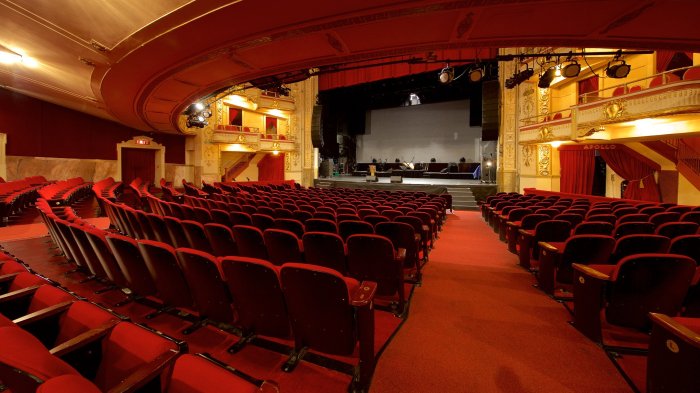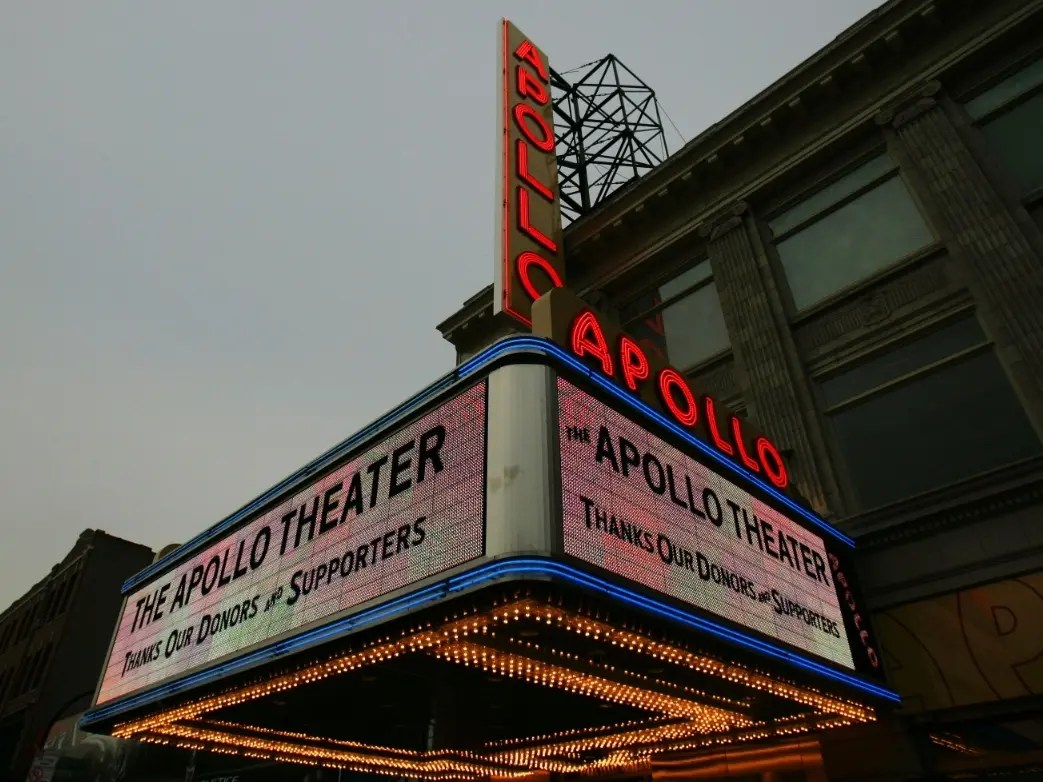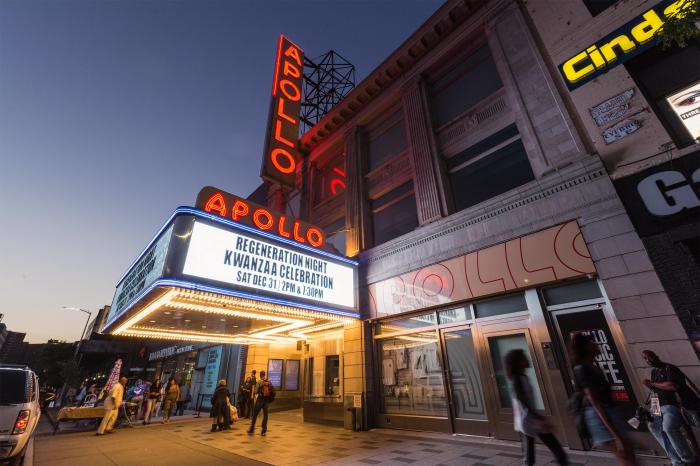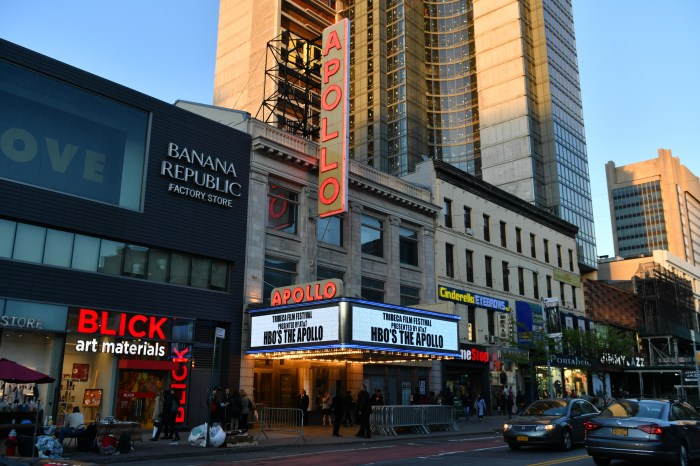Step into the legendary Apollo Theater, a beacon of African American culture and a testament to the enduring power of entertainment. From its humble beginnings to its status as a National Historic Landmark, the Apollo has witnessed countless iconic performances and played a pivotal role in shaping the Harlem Renaissance and beyond.
Founded in 1913, the Apollo Theater quickly became a thriving vaudeville venue, showcasing a diverse array of performers. Its stage has hosted legends such as Billie Holiday, James Brown, and Ella Fitzgerald, helping to launch their careers and cement the theater’s reputation as a breeding ground for talent.
History of the Apollo Theater

Founded in 1914, the Apollo Theater has played a pivotal role in American entertainment and culture. Originally known as Hurtig & Seamon’s New Burlesque Theater, it was renamed the Apollo Theater in 1934.
The Apollo Theater, renowned for its rich musical history, offers a captivating experience for all ages. Its diverse lineup includes family-friendly performances that cater to the interests of young audiences. If you’re seeking a memorable family vacation, consider exploring family-friendly resorts that offer a range of activities and amenities designed to create unforgettable moments for your loved ones.
After your resort adventure, return to the Apollo Theater to immerse yourselves in the vibrant world of music and entertainment.
The Early Years
During its early years, the Apollo Theater primarily hosted vaudeville acts. In the 1920s, it became a hub for African American performers, including Duke Ellington, Bessie Smith, and Louis Armstrong.
After catching a captivating show at the legendary Apollo Theater, consider incorporating eco-friendly practices into your travels. From reducing waste by packing reusable items to offsetting carbon emissions through eco-friendly travel tips , you can make a positive impact while immersing yourself in the rich cultural legacy of the Apollo.
The Harlem Renaissance
The Apollo Theater played a crucial role in the Harlem Renaissance, a period of cultural and artistic flourishing in Harlem in the 1920s and 1930s. The theater provided a platform for African American artists, musicians, and writers to showcase their talents and gain recognition.
Significant Events, Apollo theater
- 1934: The theater was renamed the Apollo Theater.
- 1935: The Apollo Amateur Night competition was established.
- 1943: The theater was purchased by Sidney Cohen.
- 1964: The Apollo Theater was designated a National Historic Landmark.
- 1991: The Apollo Theater was purchased by Percy Sutton.
- 2015: The Apollo Theater underwent a $45 million renovation.
Architectural Features of the Apollo Theater
The Apollo Theater is renowned not only for its historical significance but also for its unique architectural features. Its striking exterior and meticulously designed interior contribute to its distinct character and have played a pivotal role in shaping its acoustics and overall ambiance.
Exterior Design
- The Apollo Theater’s facade is a captivating blend of Art Deco and Neo-Classical styles. Its exterior is adorned with intricate carvings, decorative cornices, and a grand marquee that proudly displays the theater’s name.
- The theater’s entrance is flanked by two imposing columns, leading into a spacious lobby that sets the stage for the captivating performances within.
Interior Design
The interior of the Apollo Theater is equally impressive. Its auditorium features a horseshoe-shaped balcony that provides excellent sightlines for every patron. The proscenium arch, adorned with intricate plasterwork, frames the stage, creating a sense of grandeur and intimacy.
- The theater’s acoustics are renowned for their clarity and warmth, thanks to its carefully designed ceiling and walls. The use of sound-absorbing materials ensures that every note and word is清晰地delivered to the audience.
- The overall ambiance of the Apollo Theater is one of elegance and sophistication. Its plush velvet seats, warm lighting, and Art Deco details create a welcoming and inviting atmosphere that enhances the theater-going experience.
Notable Performances at the Apollo Theater

The Apollo Theater has hosted a wide range of iconic performances throughout its history, from legendary jazz and soul musicians to groundbreaking comedians and spoken word artists. These performances have not only solidified the theater’s reputation as a cultural landmark but have also had a profound impact on the evolution of American entertainment.
The following table lists some of the most significant performances that have taken place at the Apollo Theater:
| Performer | Date | Significance |
|---|---|---|
| Billie Holiday | 1933 | Holiday’s performance at the Apollo marked her first major breakthrough and helped establish her as one of the greatest jazz singers of all time. |
| Ella Fitzgerald | 1934 | Fitzgerald’s performance at the Apollo cemented her status as a rising star and led to her signing with Decca Records, which launched her legendary career. |
| The Supremes | 1964 | The Supremes’ performance at the Apollo was their first major concert in New York City and helped them achieve national recognition. |
| James Brown | 1965 | Brown’s performance at the Apollo is considered one of the most iconic live performances in music history and helped solidify his status as the “Godfather of Soul.” |
| Richard Pryor | 1968 | Pryor’s performance at the Apollo was a breakthrough moment for stand-up comedy and helped launch his career as one of the most influential comedians of all time. |
| Aretha Franklin | 1971 | Franklin’s performance at the Apollo was recorded and released as a live album, which became one of the best-selling gospel albums of all time. |
| Michael Jackson | 1983 | Jackson’s performance at the Apollo was one of his first major public appearances after the release of his album “Thriller” and helped solidify his status as a global superstar. |
These performances are just a few examples of the many iconic moments that have taken place at the Apollo Theater. The theater’s rich history and its commitment to showcasing the best in African American entertainment have made it a cultural institution and a vital part of the American music scene.
The Apollo Theater as a Cultural Landmark

The Apollo Theater is a National Historic Landmark, recognized for its exceptional significance in American history and culture. Designated in 1983, the theater’s landmark status acknowledges its pivotal role in the development and celebration of African American culture.
The Apollo Theater has been a beacon of cultural expression for over a century. It has provided a platform for countless legendary performers, including Ella Fitzgerald, Billie Holiday, James Brown, and Michael Jackson. Through its “Amateur Night” competitions, the theater has discovered and nurtured emerging talents, shaping the careers of iconic figures like Sammy Davis Jr., Lauryn Hill, and Erykah Badu.
Beyond its artistic contributions, the Apollo Theater has played a crucial role in social and cultural change. It was a meeting place for civil rights activists during the Harlem Renaissance and a venue for political rallies and protests. The theater’s programming has consistently reflected the struggles and triumphs of the African American community, providing a voice for the voiceless and inspiring generations of activists and artists.
The Apollo Theater Today

The Apollo Theater continues to thrive as a vibrant cultural institution in the 21st century. It presents a diverse range of programming, including music, dance, theater, and comedy. The theater also hosts community events, educational programs, and film screenings.
The Apollo Theater, renowned for its legendary performances, has played a pivotal role in shaping the Harlem Renaissance. After a captivating evening at the Apollo, consider extending your cultural journey by exploring the best beaches in the Caribbean. Immerse yourself in the azure waters, golden sands, and vibrant atmosphere that define these tropical havens.
Upon your return to New York City, the Apollo Theater awaits to welcome you once more with its rich history and unparalleled artistry.
To remain relevant and accessible to a diverse audience, the Apollo Theater has implemented several initiatives. These include offering affordable ticket prices, providing free or low-cost community events, and partnering with local schools and organizations to bring arts education to underserved communities.
Challenges and Opportunities
The Apollo Theater faces several challenges in the 21st century. These include the rising cost of operating a historic venue, the need to attract and retain a diverse audience, and the competition from other entertainment venues.
Despite these challenges, the Apollo Theater has several opportunities for growth. These include the potential to expand its programming, to develop new educational initiatives, and to partner with other cultural institutions to create new and exciting experiences for its patrons.
Closing Notes

Today, the Apollo Theater continues to thrive as a vibrant cultural center, offering a diverse programming of music, dance, theater, and comedy. It remains a symbol of the rich cultural heritage of Harlem and a testament to the enduring power of the arts to inspire, entertain, and bring people together.
Frequently Asked Questions
When was the Apollo Theater founded?
1913
Who are some of the most famous performers who have graced the Apollo Theater’s stage?
Billie Holiday, James Brown, Ella Fitzgerald, Stevie Wonder, Aretha Franklin
What is the Apollo Theater’s significance in the Harlem Renaissance?
It was a major venue for African American performers during the Harlem Renaissance, helping to launch the careers of many legendary artists.